|
|
|
Sort Order |
|
|
|
Items / Page
|
|
|
|
|
|
|
| Srl | Item |
| 1 |
ID:
109976
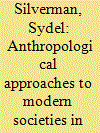

|
|
|
|
|
| Publication |
2011.
|
| Summary/Abstract |
At the time that Julian Steward was formulating the Puerto Rico Project, several other approaches to complex societies were being pursued by American anthropologists. Beginning in the 1920s, funders'-and subsequently, New Deal agencies'-interest in addressing social problems impelled microcosmic community studies in the United States. That approach, essentially functionalist and ahistorical, was extended to village studies in other countries, and Redfield's folk-urban continuum became the dominant theoretical framework for comprehending regions within nations. Concurrently, acculturation theory legitimized anthropological interests beyond "primitives" and offered an alternative, two-way cultural contact model. With the onset of World War II, the culture and personality approach was applied to strategic nations, providing holistic configurational depictions of national character. Steward's effort can be seen as a critique of, and alternative to, these approaches that were prevalent in the late 1940s. Building upon his method of cultural ecology, his orientation toward work, and his notions about sociocultural integration, he devised a different way of studying a total society. Steward's framework was modified and expanded by members of his team, both in the field and in the writing of the jointly authored book. While slow to have a wider impact, the project-both in its successes and its limitations-signaled new departures for the anthropological study of the modern world.
|
|
|
|
|
|
|
|
|
|
|
|
|
|
|
|
| 2 |
ID:
109978
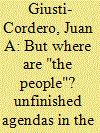

|
|
|
|
|
| Publication |
2011.
|
| Summary/Abstract |
The People of Puerto Rico is a comprehensive ethnography of major types of rural communities in pre-1950 Puerto Rico but was less successful in reconnecting those localities in a coherent portrayal of the island's social formation. A reexamination of this work's best-known subcultures, Santa Isabel (Sidney Mintz' "Cañamelar") and Ciales (Eric Wolf's "San José"), offers entry points to these communities, as well as to the key concepts that Mintz and Wolf constructed reciprocally through their research: rural proletarian and peasant, plantation and hacienda. Also present are the too-implicit spatial referents of these concepts-lowland and highland, foreland and hinterland-and their associated crop types, sugar and coffee. In this article, the historical space of Santa Isabel and Ciales will be reconsidered, in part with reference to often-overlooked nuances and caveats in Mintz' and Wolf's chapters. Foregrounding the spatial/ecological referent in "Cañamelar" and "San José" opens our sights to counterpoints between sugar and livestock, and to patterns of highland-lowland migration, kin networks, and social interaction. Familiar concepts take on new meanings as we discern supra-municipal, sub-insular, and intermediate island regions and move closer to specifying historical situations (Mintz) while renewing our theorization (Wolf).
|
|
|
|
|
|
|
|
|
|
|
|
|
|
|
|
| 3 |
ID:
109982
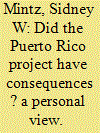

|
|
|
|
|
| Publication |
2011.
|
| Summary/Abstract |
Those of us who participated as fieldworkers in the Puerto Rico Project gathered regularly at the University of Puerto Rico (Río Piedras) during the eighteen months we were in the field to compare notes, discuss our work together, and advance our research cooperatively. During that time a distinct difference between our integration in the communities where we were working and in the university community where we gathered became apparent to some of us. It was a coefficient of the class and other differences that separated the university faculty from the working men and women among whom some of us lived in the field, and it was reflected in political differences, among others. A substantial fraction of the university faculty was strongly committed to political independence, whereas a large majority of rural dwellers supported the Popular Democratic Party, then in power. It was not surprising that these differences were linked to others, such that some of us felt we were more fully accepted by the laboring classes among whom we lived than by the intellectuals whom we knew at the university. I try here to show how our fieldwork made visible (and troublesome) these sharp political divisions.
|
|
|
|
|
|
|
|
|
|
|
|
|
|
|
|
| 4 |
ID:
129115
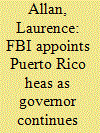

|
|
|
| 5 |
ID:
123930
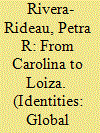

|
|
|
|
|
| Publication |
2013.
|
| Summary/Abstract |
This article considers the entanglements of race, culture and place in Puerto Rico. I analyse two distinct constructions of blackness that sustain racial hierarchies intrinsic to Puerto Rican 'racial democracy'. First, 'folkloric blackness' is a static, historicised version of blackness that represents Puerto Rico's African heritage without compromising the whitening bias of racial democracy discourse. A second construction of blackness that I term 'urban blackness' also circulates throughout the island, but instead serves as the counterpoint to the rest of the presumably 'whiter' Puerto Rico. Both have been emplaced within distinct, bounded locations, and affiliated with certain cultural practices. I argue that these 'emplacements' that arise from the associations between race, culture and place produce specific constructions of blackness that appear contradictory, yet ultimately work together to maintain the racial hierarchies intrinsic to racial democracy discourses.
|
|
|
|
|
|
|
|
|
|
|
|
|
|
|
|
| 6 |
ID:
096474
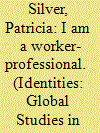

|
|
|
|
|
| Publication |
2010.
|
| Summary/Abstract |
This article examines economic and cultural capital in the lives of public school teachers in Puerto Rico across the last half of the twentieth century to examine the processes through which their class relations have formed and reformed with shifts in Puerto Rican political and economic conditions from the early days of United States rule through neoliberal school reforms of the 1990s. It traces the historical development of the "teacher class" as a female-identified, poorly paid, professional workforce, and examines the impact of class and gender ideologies in this process.
|
|
|
|
|
|
|
|
|
|
|
|
|
|
|
|
| 7 |
ID:
109980


|
|
|
|
|
| Publication |
2011.
|
| Summary/Abstract |
In the 1970s in Mexico, anthropological regional projects were designed to explore new research interests: irrigation works, peasants, rural capitalism, and mines. Julian H. Steward, Eric R. Wolf, and Sidney W. Mintz, participants in the research project on Puerto Rico, were all popular authors among the new generation of anthropologists and were frequently cited in their thesis bibliographies. This article explores the influence of the People of Puerto Rico project at the design level of these new collective and regional projects. Students were distributed within larger areas, covering various climatic and production subareas, in their research training. The important role of cities, industries, haciendas, markets, and government programs was highlighted. I suggest that senior anthropologists and academic leaders who were planning this new anthropological era were more familiar than their students with the conceptual lines of the Puerto Rico Project. I gained greater insight into the difficulties of a regional research enterprise when I did anthropological research in the 1980s at the Tennessee Valley project.
|
|
|
|
|
|
|
|
|
|
|
|
|
|
|
|
| 8 |
ID:
191982
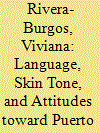

|
|
|
|
|
| Summary/Abstract |
Understanding the factors that lead Americans to racialize putatively race-neutral policies is increasingly important in a diversifying society. This paper focuses on the case of disaster relief for Puerto Ricans in the aftermath of Hurricane Maria. I draw on a framework of racial and ethnic subordination with two dimensions: inferiority–superiority, operationalized by skin color, and foreignness–Americanness, operationalized by language. I conduct a nationally representative survey experiment that varies the skin tone (light or dark) and language (English or Spanish) of otherwise similar actors who portray hurricane victims. The results suggest that two stigmatized attributes, dark skin and foreign language, do not always render an individual “doubly stigmatized.” Instead, for an already racialized group like Puerto Ricans, perceived foreignness may offset Americans’ stereotypes about the cultural pathologies of a racial underclass. Therefore, this paper underscores the importance of a multidimensional and intersectional approach to the study of racial and ethnic politics.
|
|
|
|
|
|
|
|
|
|
|
|
|
|
|
|
| 9 |
ID:
109977


|
|
|
|
|
| Publication |
2011.
|
| Summary/Abstract |
The People of Puerto Rico occupies an ambivalent place in both the genealogy of anthropological theory and the understanding of Puerto Rican society. Its co-authors collectively developed a uniform and complex conceptual scheme which expressed both convergence and divergence among them. The book furthered Marxist approaches in U.S. anthropology and was the first serious scholarly materialist analysis of Puerto Rico. While privileging the lives of common people, it fell short of representing important strains of Puerto Rican diversity and socio-historical dynamics. The Puerto Rico Social Anthropology Project used four different models to explain the genesis of cultural forms and the interrelations among aspects of society/culture, in a given, homogeneous, "subculture" or "socio-cultural segment" of a complex society. The Project's members stressed a linear-utilitarian analysis of these subcultures, but where they could not account for observed cultural forms with such an approach, they appealed to the culture-psychology relation. This article considers the four interlinked paradigms, the associated analysis of socio-cultural trends, the resulting problematic theoretical consequences, and the flawed Marxism of the work.
|
|
|
|
|
|
|
|
|
|
|
|
|
|
|
|
| 10 |
ID:
109979
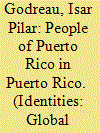

|
|
|
|
|
| Publication |
2011.
|
| Summary/Abstract |
Like other students of social sciences trained in Puerto Rico in the late 1980s and 1990s, the author of this article learned about The People of Puerto Rico while studying abroad in the US - not in Puerto Rico. This article explores why, in spite of its influential contribution to anthropology and to the social sciences in general, this important book was not widely read or taught at the University of Puerto Rico (UPR). To explore this paradox, the author examines the very critical reception that the People of Puerto Rico project had among Puerto Rican academics at the time of its development and thereafter. The article pays particular attention to the political climate and to the criticism posed by Dr. Milton Pabón, a political scientist who believed in political independence for Puerto Rico. Pabón disagreed with, among other things, the book's understanding that Puerto Rico did not have a "national culture." Pabón died in 2009, but offered an interview and wrote an unpublished manuscript about the book before his death. This paper summarizes some of his views and contextualizes the effects of similar "pro-independence" critiques on the limited dissemination of the book at the UPR. The article contrasts such views to more contemporary "post-modern" understandings of the Puerto Rican nation. Finally, based on an analysis of informal interviews, library records, and the graffiti of library copies, the author also comments on the current reception of the book among university students.
|
|
|
|
|
|
|
|
|
|
|
|
|
|
|
|
| 11 |
ID:
032546
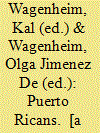

|
|
|
|
|
| Publication |
New yerk, Praeger Publishers, 1973.
|
| Description |
xii, 332p.Hbk
|
|
|
|
|
|
|
|
|
|
|
|
Copies: C:1/I:0,R:0,Q:0
Circulation
| Accession# | Call# | Current Location | Status | Policy | Location |
| 012680 | 909.04687295/WAG 012680 | Main | On Shelf | General | |
|
|
|
|
| 12 |
ID:
109975
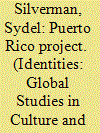

|
|
|
|
|
| Publication |
2011.
|
| Summary/Abstract |
In the late 1940s Julian Steward initiated a social anthropological study of Puerto Rico, carried out by a team working in a range of communities representing different ecological zones. The project was a landmark in anthropology but met with criticism from Puerto Rican scholars. The articles in this collection reconsider the Puerto Rico Project in terms of its place within the history of anthropology, its reception in Puerto Rico and elsewhere, and some theoretical and political issues raised by it.
|
|
|
|
|
|
|
|
|
|
|
|
|
|
|
|
| 13 |
ID:
130592
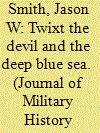

|
|
|
|
|
| Publication |
2014.
|
| Summary/Abstract |
The article examines the role of the marine environment in naval operations during the Spanish-American War era. Off Cuba, Puerto Rico, and the Philippines, naval commanders struggled with inaccurate charts in a complex marine environment. Long associated with the needs of maritime commerce, the Navy's charts and sailing directions could not account for the new strategic importance of these waters. Knowledge of the marine environment was increasingly critical to command of the sea. This article reveals ways in which marine environmental history can deepen our understanding of war at sea.
|
|
|
|
|
|
|
|
|
|
|
|
|
|
|
|
|
|
|
|
|